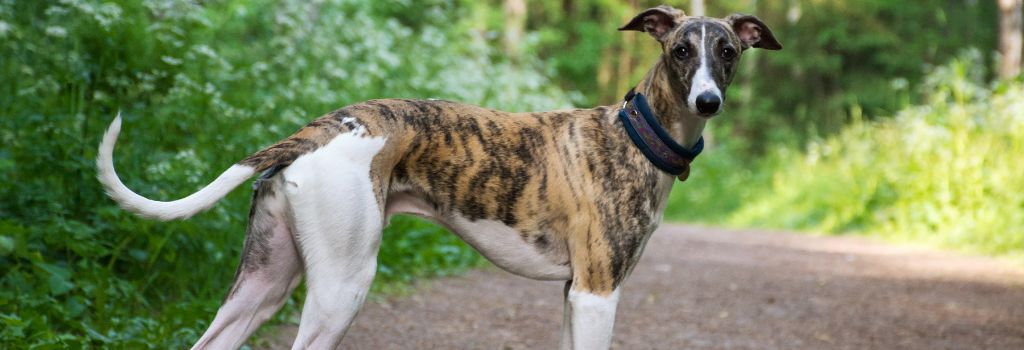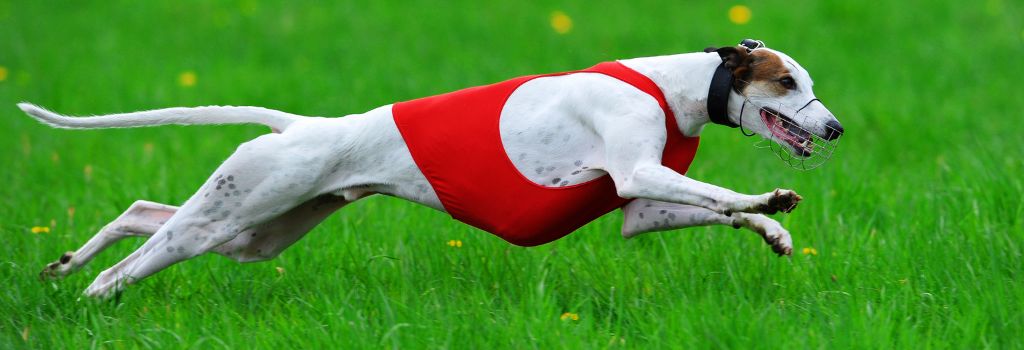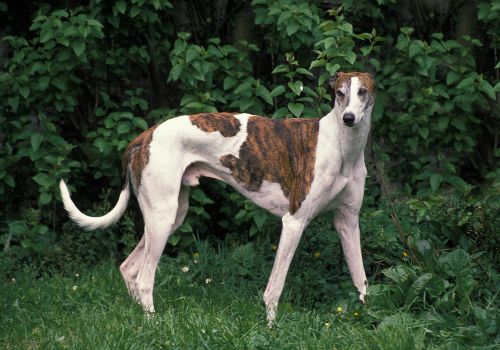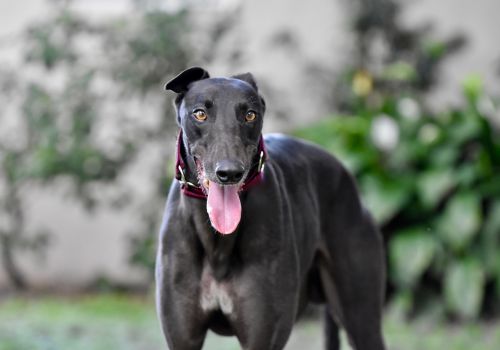A dog that's as enigmatic as it is endearing: the Greyhound. If you're the proud parent of one of these four-legged speedsters, you already know they're a delightful paradox—fast on the track but easygoing at home.
Why You Fell in Love with Your Greyhound
You probably chose your Greyhound because she fit perfectly into various living situations, right? These dogs are incredibly adaptable, making them great whether you live in a bustling city apartment or a quiet suburban home. Plus, they're the ideal roommate—quiet as a mouse, requiring little to no encouragement to keep the barking down.
Here's a fun fact: Despite their need for speed, Greyhounds are surprisingly low-maintenance in the exercise department. A few short walks and a little playtime are often enough to keep them happy. Best of all, they're mild-mannered and super easy to get along with, making them the perfect addition to almost any family.

The Quirks We Adore (And Some to Watch For)
Of course, no dog is a complete walk in the park, and Greyhounds are no exception. They can get a little anxious if left alone for too long. Pro tip: A comfy bed and some toys can go a long way in keeping your pup content while you're away.
Be aware, though, your Greyhound might view smaller animals as something to chase, thanks to their innate prey drive. Early socialization can help curb this instinct. And speaking of training, these dogs might take a little longer to master the whole "indoor plumbing" concept. Plus, they might be a bit reserved around strangers, but once they get to know someone, they're usually as sweet as pie.
Why We Wouldn't Trade Them for the World
Let's be honest, all these quirks make our Greyhounds even more lovable! These dogs are quiet but full of personality, remarkably low-energy indoors, and just a joy to have around the house.
A Brief Run Through History
Did you know Greyhounds are ancient breeds, believed to have originated in Egypt? These dogs were not built for marathons; they were bred for short, intense sprints while hunting game like deer and hare. They’re often dubbed “40-mph couch potatoes” for their ability to switch from high-speed chasing to lounging in no time flat! These dogs are the Usain Bolts of the canine world, reaching speeds up to a jaw-dropping 44 mph!
But don't let that athleticism fool you. At home, they're all about that couch life. Your Greyhound will likely be more than content with a cozy bed and a loving family, making them excellent companions for kids and other calm family dogs.

Genetic Predispositions for Greyhounds
Anesthesia Woes? Not for Your Greyhound!
If you're a Greyhound parent, you might've heard that anesthesia can be a bit tricky for these elegant speedsters. But worry not! We're well-versed in Greyhound-specific quirks like hyperthermia in anxious pups or hypothermia in those lean bodies. We also keep an eye on how long it takes your pooch to wake up from certain intravenous anesthetics. Although the risk can't be zero, our expertise makes anesthesia a whole lot safer for your Greyhound!
The Dreaded Bloat: What You Need to Know
One condition that tends to target deep-chested dogs like Greyhounds is bloat, or Gastric Dilatation and Volvulus (GDV). It's as scary as it sounds—the stomach twists and fills with gas, cutting off blood supply. This is an emergency, folks! Signs to watch for include retching with nothing coming up, an enlarged abdomen, or a peculiar "prayer" pose. Time is of the essence, so rush to an emergency vet ASAP. Preventative surgeries are also an option to secure the stomach in place.
Cancer in Greyhounds: Early Detection is Key
Cancer is a grim reality for many aging dogs, and Greyhounds are at a slightly higher risk, especially at younger ages. Don't lose hope; many types of cancer can be treated with surgery or even chemotherapy. We'll be diligent about doing periodic bloodwork and scrutinizing your dog for any lumps or bumps. The most common type we see is osteosarcoma, affecting the bones and identified through symptoms like lameness. If your pup is limping, don't delay—every moment counts.
Beware of Bleeding Disorders
Greyhounds are more prone to blood disorders like Von Willebrand's Disease. These conditions might not show until a surgery or injury results in excessive bleeding. But don’t worry, we’ve got you covered! We'll perform special tests before any surgical procedure to ensure your pup's clotting functions are up to snuff.
The Joints of a Young Greyhound
You may be tempted to overfeed that adorable Greyhound puppy, but rapid growth can result in a condition called osteochondritis dissecans (OCD). This affects the joints and may require surgical intervention. Stick to the four-pound-per-week growth rate, and always opt for a large-breed puppy diet.
Battling Arthritis in Greyhounds
Arthritis is a common nuisance in older dogs, and Greyhounds are no exception. Thankfully, we have several treatments at our disposal. A balanced diet and regular exercise can also help alleviate symptoms. Keeping your Greyhound at a healthy weight will work wonders for those aging joints.

Back Problems: Know the Signs
Intervertebral disc disease (IVDD) can be a major issue for Greyhounds. If your pooch suddenly hesitates to jump or climb stairs, seems hunched, or is visibly in pain, it’s a red flag. In severe cases, prompt surgical intervention is critical. Weight control and using ramps can significantly reduce the risk.
High Blood Pressure in Greyhounds: What's the Deal?
You're not the only one whose blood pressure spikes during that morning traffic! Greyhounds are more prone to hypertension, which can lead to some serious issues like strokes and blindness. We'll keep tabs on this through regular check-ups and medication as needed.
Eye Health: More Than Meets the Eye
Greyhounds can be prone to a variety of eye problems, some of which can lead to blindness if not promptly treated. From cataracts to a condition called Pannus—which is like a suntan for your dog’s eyeballs—we'll be vigilant about checking your Greyhound’s eyes at every visit.
Extra Teeth: The Unusual Chompers in Your Greyhound
Some dog breeds, like your Greyhound, can have extra teeth! Generally, this isn't a cause for alarm. If these bonus chompers erupt properly and don't overcrowd the mouth, they're typically harmless. However, when they do cause issues—like pushing out more important teeth—they can be safely removed during an anesthetic dental procedure. So next time you're playing fetch, keep an eye on that smile!
Inflammatory Bowel Disease: More Than Just a Bellyache
Does your Greyhound have frequent digestive upsets that leave you scratching your head? Chronic vomiting or diarrhea may signal Inflammatory Bowel Disease (IBD). This immune system disorder can make your dog's intestinal lining thicken, affecting nutrient absorption. Stress, dietary changes, and parasites can worsen symptoms. Diagnostic tests, like intestinal biopsies, may be needed for confirmation. The bright side? Lifelong medications and specialized diets often help keep IBD in check.
Epilepsy: Managing Seizures in Your Greyhound
If you've ever witnessed your dog have a seizure, it's a scary experience. Greyhounds are more prone to epilepsy, which is typically inherited. Seizures usually begin when dogs are between six months and three years old. It's crucial to get an initial diagnostic workup to pinpoint the cause. Lifelong medication is usually prescribed, along with periodic blood tests to monitor its effectiveness. If your Greyhound experiences a seizure, remember to keep him safe from injuring himself but steer clear of his mouth to avoid accidental bites.
Megaesophagus: When Eating Becomes a Struggle
Imagine if the simple act of eating became a complicated task. For Greyhounds with megesophagus, this is a daily challenge. The condition hinders the esophagus from contracting normally, leaving food stuck instead of moving it into the stomach. Oddly-shaped vomit can be a clue. If you notice this, a quick x-ray could provide answers. While there's no cure, changes in feeding posture and diet can help manage the condition.

Allergies: Not Just a Human Problem
In humans, allergies often lead to sneezing, but in Greyhounds, it's usually the skin that takes the hit. Atopy, a skin allergy, is common among these dogs. You'll often notice symptoms like paw licking, face rubbing, and frequent ear infections. The good news? Multiple treatment options can make life much easier for your itchy pup.
Kidney Disease: Early Detection is Key
Glomerulonephropathy, a kidney disease that often afflicts Greyhounds, can be fatal if not diagnosed early. Since damaged kidneys leak protein, a urine analysis can be a lifesaver. The sooner you catch it, the easier (and more affordable) the treatment will be, possibly involving a special diet tailored for kidney health.
Hair Loss: Going Bald Isn't Just a Human Thing
Don't be shocked if your Greyhound starts losing hair as they age—it's not uncommon! Unlike other conditions, this type of hair loss isn't itchy, although the skin might be dry. This usually affects the throat, chest, belly, and insides of the legs. While there's no known cure, we can rule out other treatable conditions with similar symptoms, like thyroid issues. Some supplements or hormones might help slow the process down a bit.
Don't have a vet in your area yet? We can help you find a local veterinarian.
If you have more questions, the GeniusVets Telehealth platform will give you unlimited access to text and/or video calls with board-certified veterinarians! To learn more click here.


